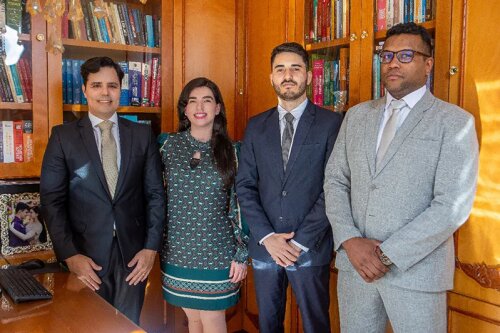Best Guardianship Lawyers in Goiânia
Share your needs with us, get contacted by law firms.
Free. Takes 2 min.
List of the best lawyers in Goiânia, Brazil
About Guardianship Law in Goiânia, Brazil
Guardianship, known in Brazil as "tutela" or "curatela," is a legal measure designed to protect individuals who are unable to fully manage their own affairs. This typically includes minors without parental care, elderly people, and adults with disabilities or incapacitating illnesses. In Goiânia, as in the rest of Brazil, guardianship is strictly regulated by the Civil Code and overseen by the local courts to ensure the safeguarded person’s best interests are maintained at all times.
Why You May Need a Lawyer
People often seek legal help for guardianship issues in Goiânia due to the complexity of the required court procedures and the sensitive nature of these cases. Common situations include:
- When parents or legal guardians pass away and minors need a new guardian appointed.
- When an adult relative loses the capacity to manage their own personal or financial life due to illness or disability.
- Disagreements among family members about who should be appointed as guardian.
- Allegations of abuse or neglect by a current guardian.
- Modifying or terminating existing guardianship arrangements.
A lawyer can provide guidance through the judicial process, represent your interests in court and ensure all legal requirements are properly addressed.
Local Laws Overview
In Goiânia, guardianship matters are governed primarily by the Brazilian Civil Code, along with specific provisions in the Civil Procedure Code and relevant statutes. Here are key aspects of local guardianship laws:
- Guardianship of minors is called "tutela" and typically applies when parents are deceased or stripped of parental rights.
- Guardianship of incapacitated adults is called "curatela," generally for people with proven mental or physical incapacity.
- All guardianship arrangements must be approved by a judge in family courts (Vara de Família e Sucessões) in Goiânia.
- The appointment process requires presenting evidence, legal documentation and in some cases, medical reports.
- Guardians are liable for accounting and reporting on the person’s well-being and assets, periodically presenting this information to the court.
- The person under guardianship or their family may request changes or the end of the arrangement if circumstances evolve.
Frequently Asked Questions
What is the difference between tutela and curatela?
Tutela is a form of guardianship for minors who are without parental care, while curatela is for adults unable to care for themselves due to mental or physical conditions.
How do I apply for guardianship in Goiânia?
You must file a petition with the Family Court (Vara de Família) in Goiânia. It usually requires legal documentation, identification of the person in need, and evidence of your suitability as a guardian.
Who can become a guardian?
Brazilian law prioritizes close family members, but courts may also appoint third parties if they are deemed suitable and in the best interests of the person who needs protection.
Does the guardian have full control over the person's affairs?
No. The guardian’s powers and responsibilities are determined by the court and are subject to regular oversight and judicial review to prevent abuse or mismanagement.
Can a guardianship arrangement be changed or ended?
Yes. If circumstances change - such as the recovery of capacity or a change in guardian suitability - family members or the person under guardianship can petition the court for modification or termination.
What are the obligations of a guardian?
Guardians must act in the best interest of the person, manage their assets responsibly, and periodically report to the court. They must also ensure the person’s well-being and protection.
How long does the guardianship process take?
The duration varies depending on case complexity, required documentation and whether there are disputes. Simple cases can be resolved in a few months, while contested ones may take longer.
Is it necessary to have a lawyer for guardianship proceedings?
While not always legally mandatory, having a lawyer is strongly advised due to the judicial complexity and required compliance with procedural rules.
Can a minor under guardianship choose their guardian?
Generally, courts consider the minor’s wishes if they are old enough to express them, but the final decision prioritizes the minor’s best interests and legal criteria.
What happens if a guardian is suspected of abuse or neglect?
Anyone can report suspected abuse to the authorities or the court. If proven, the court can remove the guardian and appoint a new one, and legal actions including criminal charges may follow.
Additional Resources
For more information or assistance, consider the following resources in Goiânia:
- Forum de Goiânia - Vara de Família e Sucessões: Handles family law and guardianship cases.
- Ministério Público do Estado de Goiás: Can initiate guardianship cases and supervise guardians’ actions.
- Defensoria Pública do Estado de Goiás: Provides free legal assistance for individuals who cannot afford private attorneys.
- Conselho Tutelar: Handles child protection issues and can advise on minor guardianship situations.
- CREAS - Centro de Referência Especializado de Assistência Social: Offers social support and guidance to families dealing with guardianship matters.
Next Steps
If you need legal assistance with a guardianship matter in Goiânia, start by gathering all relevant documentation, such as identification, medical reports and information about the person needing protection. It is highly recommended to consult with a specialized lawyer familiar with guardianship law in Goiás to evaluate your case, explain your rights and represent you in court if needed. If you cannot afford a private lawyer, seek help from the Defensoria Pública. Finally, act promptly to ensure the well-being and legal protection of the person in need.
Lawzana helps you find the best lawyers and law firms in Goiânia through a curated and pre-screened list of qualified legal professionals. Our platform offers rankings and detailed profiles of attorneys and law firms, allowing you to compare based on practice areas, including Guardianship, experience, and client feedback.
Each profile includes a description of the firm's areas of practice, client reviews, team members and partners, year of establishment, spoken languages, office locations, contact information, social media presence, and any published articles or resources. Most firms on our platform speak English and are experienced in both local and international legal matters.
Get a quote from top-rated law firms in Goiânia, Brazil — quickly, securely, and without unnecessary hassle.
Disclaimer:
The information provided on this page is for general informational purposes only and does not constitute legal advice. While we strive to ensure the accuracy and relevance of the content, legal information may change over time, and interpretations of the law can vary. You should always consult with a qualified legal professional for advice specific to your situation.
We disclaim all liability for actions taken or not taken based on the content of this page. If you believe any information is incorrect or outdated, please contact us, and we will review and update it where appropriate.









